Books
-
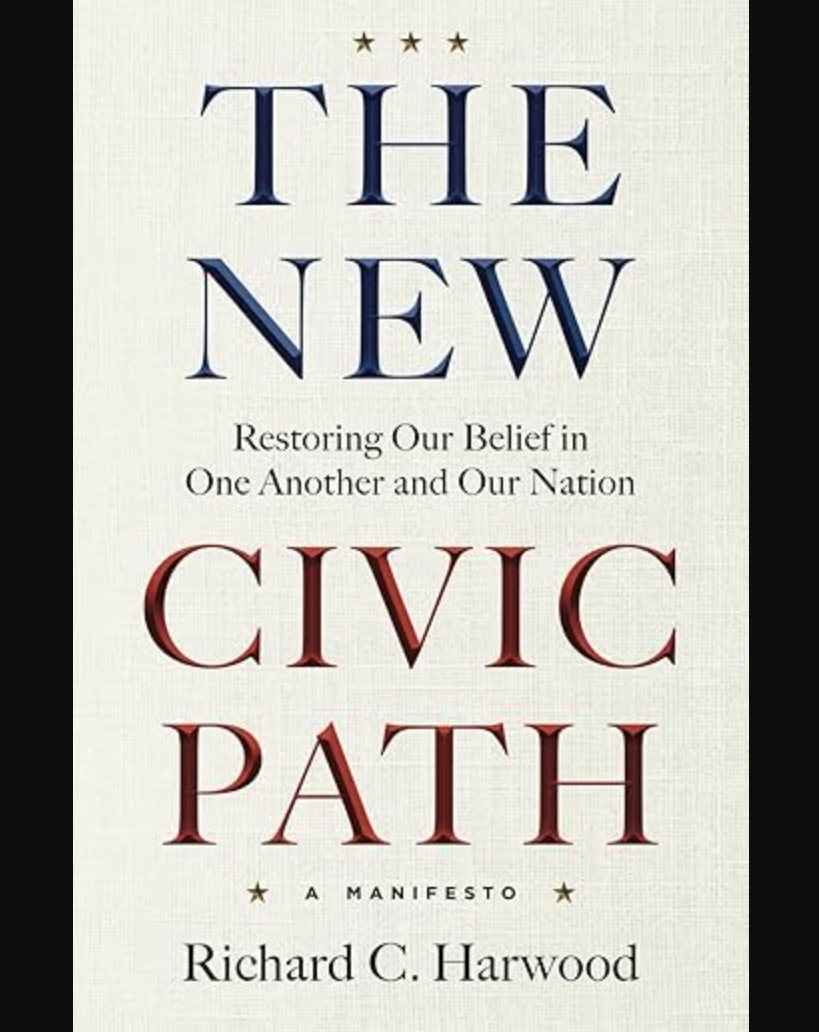
We are suffering from a crisis of belief in our country today. So many people have lost faith in America—in our leaders, institutions, and even one another. The status quo is not working for far too many of us. Our central task today is to meet this historic moment. But how do we grow our belief that we can get things done together—not as Republicans or Democrats or Independents, but as Americans? How do we rebuild trust and reclaim agency?
In this deeply personal manifesto written while crisscrossing the country for his “Enough. Time to Build.” civic campaign, Richard C. Harwood reveals how we can address the fundamental challenges holding us back in America today. We must dedicate ourselves to forging a new civic path that grows our belief that we can move forward amid our real differences. The New Civic Path is a must-read for those who want to spark civic renewal and get our communities and the country moving again.
-
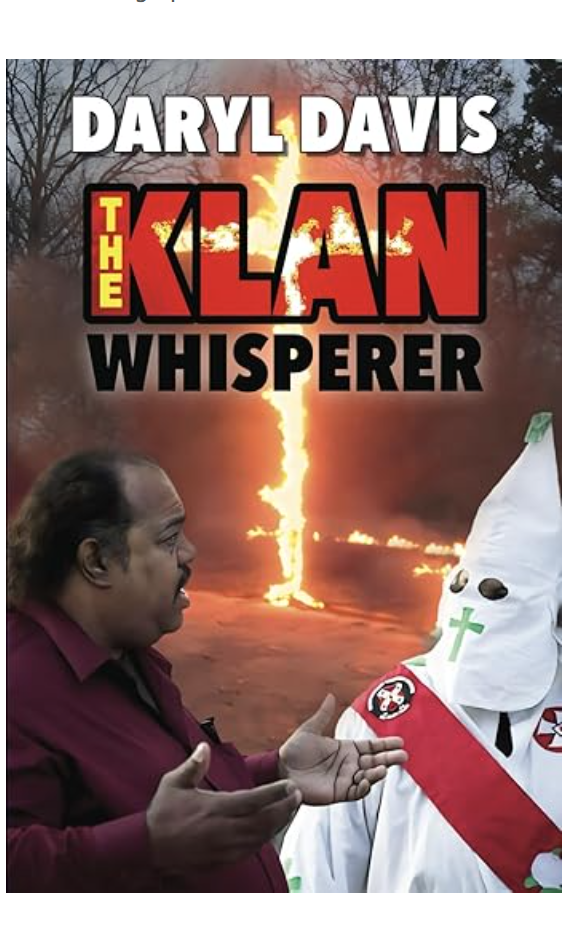
“After 160 years of nothing but violence and hatred, it’s time we get to know one another on a social basis, not under a cover of darkness,” explains musician Daryl Davis of his extraordinary journey into the heart of one of America’s most fanatical institutions, the Ku Klux Klan.
Driven by the need to understand those, who without ever having met him, hate him because of the color of his skin, Daryl decides to seek out the roots of racism. His mesmerizing story, told in gritty words and startling photographs, is both harrowing and awe-inspiring.
Finding that the Klan is entrenched not only in the Deep South, but in his own neighborhood, Davis sets out to meet Grand Dragons, Imperial Wizards and rank-and-file members from all over the country.
From being physically attacked by Klansmen and Klanswomen, to being defended by Klan members, Davis has also been given robes and hoods by leaders and members who leave the organization and renounce their racist ideology after coming to know him.
Davis journeys on in his courageous quest into the heart of ignorance for what he believes is a ray of hope for harmony between all people and the future of mankind.
-
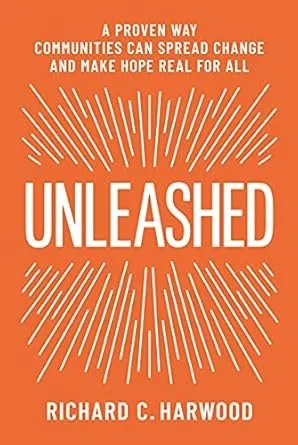
How can we unleash the innate potential of people, institutions and groups in communities to address our common challenges? And how can we do this by creating a civic culture in which people come together to shape their own lives and gain real hope?
In Unleashed, Richard C. Harwood draws on his 30 years of experience working with communities to answer these two critical questions. Harwood shows us that:
-Change ripples out in communities through an interaction of highly intentional actions and serendipity.
-The change then cascades and spreads through a chain of events over time.
-These interactions often occur in unexpected ways, in unimaginable combinations of people and partners, and with unforeseen results.
-This chain reaction can be proactively catalyzed and nurtured.
-Through these interactions, people can restore a belief that we can get things done together.
Americans yearn to create a society that reflects the best of us, the best in us. In Unleashed, Harwood helps us see how we can create a more equitable, fair, inclusive and hopeful path forward.
-
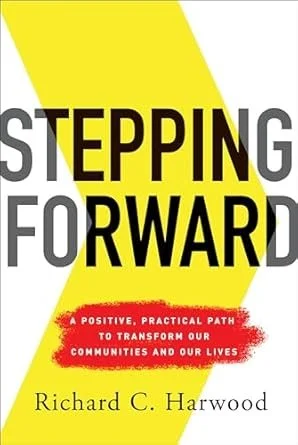
Many of us are frustrated by the divisive nature of our public discourse, mistrust and broken promises. We lack hope that we can bridge our divides, come together and get things done.
Rich Harwood offers a new path forward. He argues that we don’t have to accept the divisions, gridlock and negativity happening in our country. He knows, from working in communities for more than 30 years, that we can rediscover what we share in common and actively build upon it.
Stepping Forward shows us how to channel our frustrations, energies, and aspirations to get on a more hopeful path. This book shows us how we can step forward to:
-Turn Outward to see and hear each other again and afford every person human dignity
-Rediscover what we share in common by focusing on our shared aspirations, even amid our real differences
-Recognize we must tap into our innate capabilities to produce meaningful change
-Forge a new shared responsibility to marshal community resources to solve problems and harness people’s yearning for genuine engagement
-Create a new can-do narrative by focusing on civic parables that remind us that we can be actors, shapers and builders of our shared lives
-

The twists and turns of American politics are unpredictable, but the tone is a troubling given. It’s one of grievance. More and more Americans are convinced that they’re losing because somebody else is winning. How did we get here? What does it say about us, and where does it leave us? The Age of Grievance examines these critical questions and charts a path forward. It is a lucid, powerful examination of the ways in which grievance has come to define our current culture and politics, on both the right and left.
-
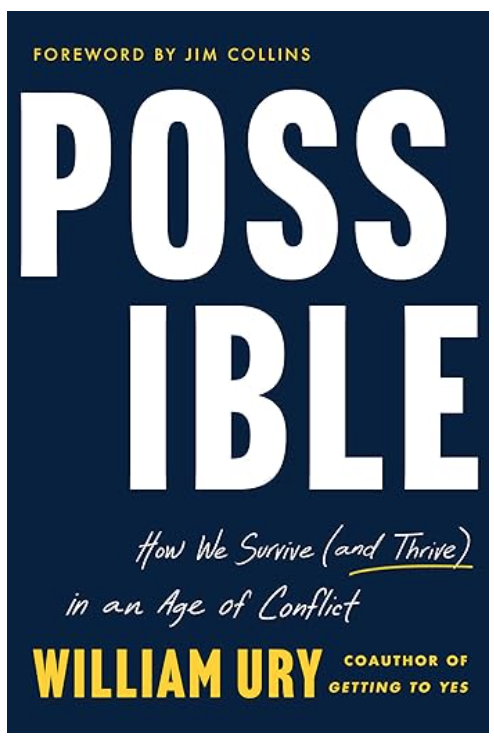
Conflict is increasing everywhere, threatening everything we hold dear—from our families to our democracy, from our workplaces to our world. With this groundbreaking book, William Ury shares a new “path to possible” - time-tested practices that will help readers unlock their power to constructively engage and transform conflict. It is an essential guide for anyone looking to break through the toughest conflicts—in their workplace, family, community or the world.
-
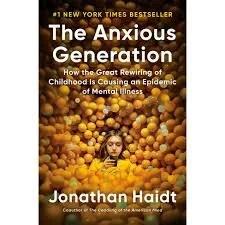
In The Anxious Generation, social psychologist Jonathan Haidt lays out the facts about the epidemic of teen mental illness that hit many countries at the same time. He then investigates the nature of childhood, including why children need play and independent exploration to mature into competent, thriving adults. Haidt shows how the “play-based childhood” began to decline in the 1980s, and how it was finally wiped out by the arrival of the “phone-based childhood” in the early 2010s. He presents more than a dozen mechanisms by which this “great rewiring of childhood” has interfered with children’s social and neurological development, covering everything from sleep deprivation to attention fragmentation, addiction, loneliness, social contagion, social comparison, and perfectionism. He explains why social media damages girls more than boys and why boys have been withdrawing from the real world into the virtual world, with disastrous consequences for themselves, their families, and their societies.
-
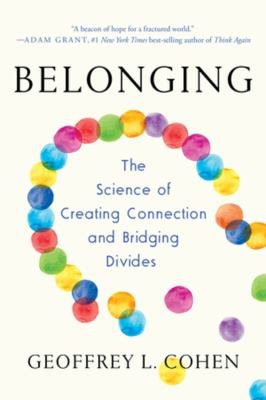
Discover the secret to flourishing in an age of division: belonging. In a world filled with discord and loneliness, finding harmony and happiness can be difficult. But what if the key to unlocking our potential lies in this deceptively simple concept?
Belonging is the feeling of being a part of a group that values, respects, and cares for us—a feeling that we can all cultivate in even the smallest corners of social life.
In Belonging: The Science of Creating Connection and Bridging Divides, Stanford University professor Geoffrey L. Cohen draws on his own and others’ groundbreaking scientific research to offer simple, concrete solutions for fostering a sense of belonging. These solutions can generate surprisingly significant and long-lasting benefits.
-
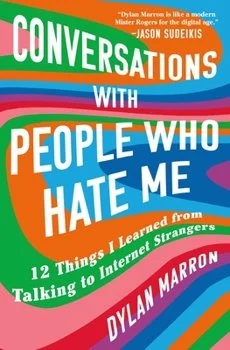
Marron retraces his journey through a project that connects adversarial strangers in a time of unprecedented division. After years of production and dozens of phone calls, he shares what he’s learned about having difficult conversations and how having them can help close the ever-growing distance between us.
Charmingly candid and refreshingly hopeful, Conversations with People Who Hate Me will serve as both a guide to anyone partaking in difficult conversations and a permission slip for those who dare to believe that connection is possible.
-
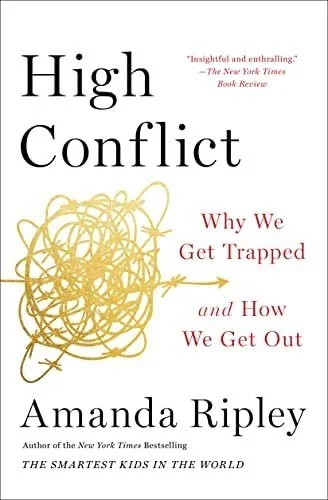
When we are baffled by the insanity of the “other side”—in our politics, at work, or at home—it’s because we aren’t seeing how the conflict itself has taken over.
That’s what “high conflict” does. It’s the invisible hand of our time. And it’s different from the useful friction of healthy conflict. That’s good conflict, and it’s a necessary force that pushes us to be better people.
People do escape high conflict. Individuals—even entire communities—can short-circuit the feedback loops of outrage and blame, if they want to.
-

The partisan divide in the United States has widened to a chasm. Legislators vote along party lines and rarely cross the aisle. Political polarization is personal, too - and it is making us miserable. Surveys show that Americans have become more fearful and hateful of supporters of the opposing political party and imagine that they hold much more extreme views than they actually do. How can we loosen the grip of this toxic polarization and start working on our most pressing problems?
The Way Out offers an escape from this morass. Social psychologist Peter T. Coleman explores how conflict resolution and complexity science provide guidance for dealing with seemingly intractable political differences…Coleman meticulously details principles and practices for navigating and healing the difficult divides in our homes, workplaces, and communities, blending compelling personal accounts from his years of working on entrenched conflicts with lessons from leading-edge research. The Way Out is a vital and timely guide to breaking free from the cycle of mutual contempt in order to better our lives, relationships, and country.
-
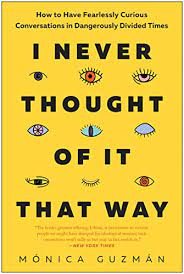
In this timely, personal guide, Mónica, the chief storyteller for the national cross-partisan depolarization organization Braver Angels, takes you to the real front lines of a crisis that threatens to grind America to a halt—broken conversations among confounded people. She shows you how to overcome the fear and assumptions that surround us to finally do what only seems impossible: understand and even learn from people in your life whose whole worldview is not just different from yours, but opposed.
In these pages, you'll learn:
How to ask what you really want to know (even if you're afraid to)
How to grow smarter from even the most tense interactions, online or off
How to cross boundaries and find common ground—with anyone
Whether you're left, right, center, or sick of the labels: If you're ready to fight back against the confusion, heartbreak, and madness of our dangerously divided times—in your own life, at least—Mónica's got the tools and fresh, surprising insights to prove that seeing where people are coming from isn't just possible. It's easier than you think.
-

Crucial Conversations provides powerful skills to ensure every conversation - especially difficult ones - leads to the results you want. Written in an engaging and witty style, it teaches listeners how to be persuasive rather than abrasive, how to get back to productive dialogue when others blow up or clam up, and it offers powerful skills for mastering high-stakes conversations, regardless of the topic or person.
This new edition addresses issues that have arisen in recent years. You'll learn how to: respond when someone initiates a crucial conversation with you; identify and address the lag time between identifying a problem and discussing it; and communicate more effectively across digital mediums.
-
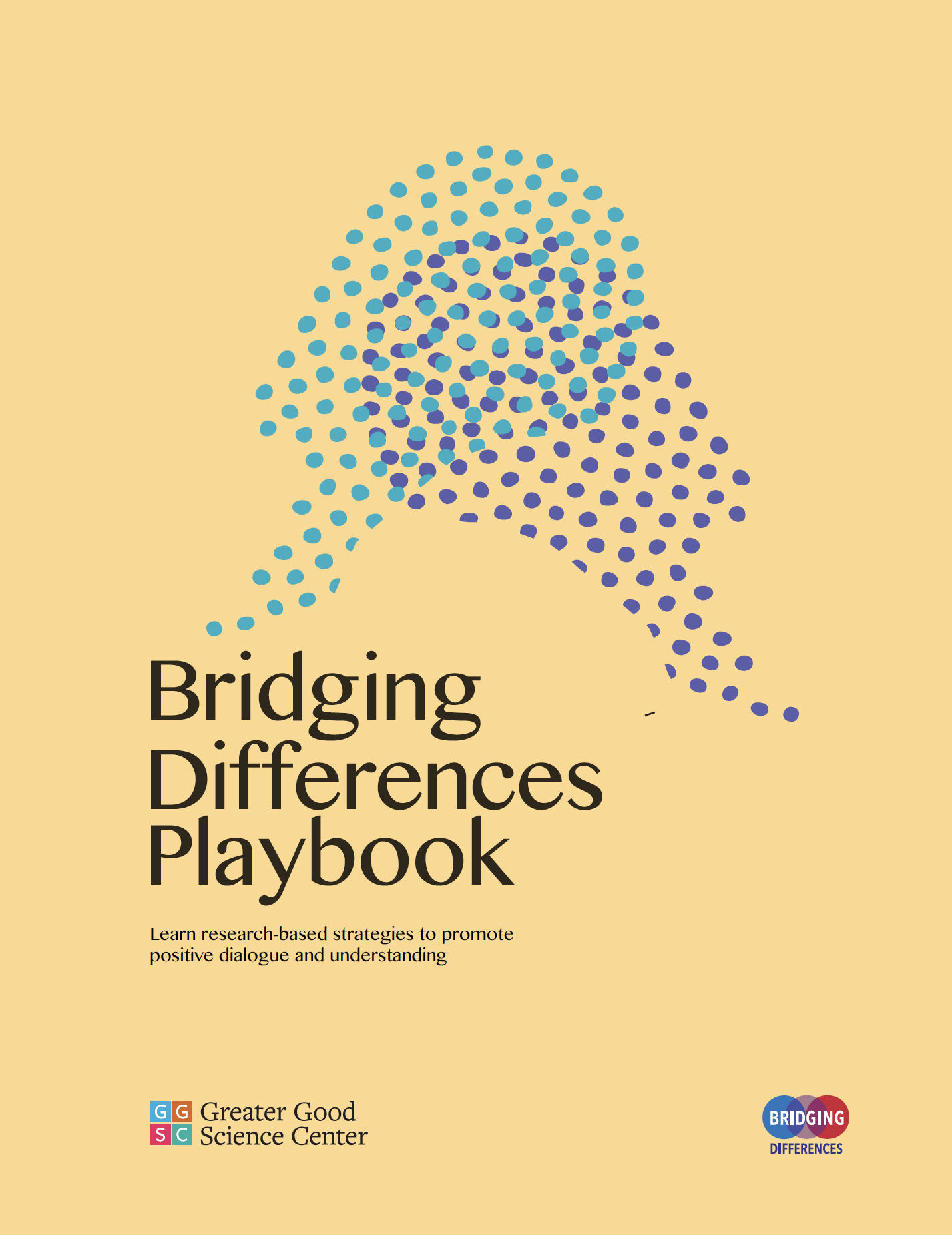
From the Greater Good Science Center: Under our Bridging Differences initiative, we have reviewed decades of scientific studies, interviewed dozens of leaders, and surveyed the landscape of relevant programs. From this work we have collected enduring wisdom and best practices for bridging political, racial, religious, or other divides. It has led us to identify a set of skills and strategies that support positive dialogue, relationships, and understanding between groups or individuals.
-
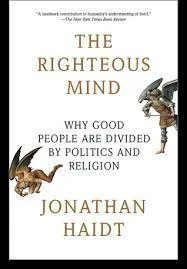
Why can’t our political leaders work together as threats loom and problems mount? Why do people so readily assume the worst about the motives of their fellow citizens?
In The Righteous Mind, social psychologist Jonathan Haidt explores the origins of our divisions and points the way forward to mutual understanding. His starting point is moral intuition - the nearly instantaneous perceptions we all have about other people and the things they do. These intuitions feel like self-evident truths, making us righteously certain that those who see things differently are wrong.
-
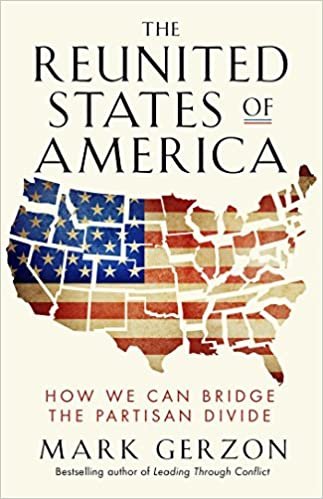
Out of Many, One
In this era of poisonous partisanship, The Reunited States of America is a lifesaving antidote. At a time when loyalty to party seems to be overpowering love of country, it not only explains how we can bridge the partisan divide but also tells the untold story of how our fellow citizens already are doing it.
This book, a manifesto for a movement to reunite America, will help us put a stop to the seemingly endless Left-Right fistfight while honoring the vital role of healthy political debate. Mark Gerzon describes how citizens all over the country—Republicans, Democrats, and independents—are finding common ground on some of the most divisive and difficult issues we face today.
-
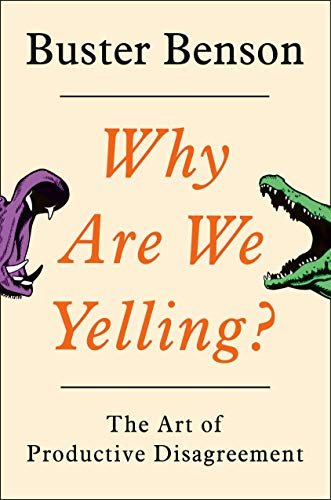
Have you ever walked away from an argument and suddenly thought of all the brilliant things you wish you'd said? Do you avoid certain family members and colleagues because of bitter, festering tension that you can't figure out how to address?
Now, finally, there's a solution: a new framework that frees you from the trap of unproductive conflict and pointless arguing forever.
Why Are We Yelling will shatter your assumptions about what makes arguments productive. You'll find yourself having fewer repetitive, predictable fights once you're empowered to identify your biases, listen with an open mind, and communicate well.
Articles
-
Friends and Family Conversation Tip Sheet
From Living Room Conversations
How to talk with your family and maybe even enjoy it!
Family gatherings can pose a unique challenge in this politically charged climate. Why? Because family is known for breaking host and guest social norms. Because family knows each other’s triggers and because family relations often require more of us. Emotional stakes tend to be higher, conversations are colored by history and it can feel easier to take the proverbial gloves off and fight dirty, unconstrained by the politeness we give others.
This tip sheet can help you use Living Room Conversations skills to practice loving and connecting with your family, even when you don’t like what they believe.
https://livingroomconversations.org/friends-and-family-guide/LEARN MORE
-
Are Social Media Driving Political Polarization?
Greater Good Magazine
Battles rage on Facebook and Twitter—but their influence on real-world politics is subtler than you might think.
BY LEE DE-WIT, SANDER VAN DER LINDEN, CAMERON BRICK | JANUARY 16, 2019
Excerpt:
Americans are more divided along party lines than ever before.In the past two decades, the percentage of Americans who consistently hold liberal or conservative beliefs—rather than a mix of the two, which is the case for most people—has jumped from 10 percent to over 20. At the same time, beliefs about the other side are becoming more negative. Since 1994, the number of Americans who see the opposing political party as a threat to “the nation’s well-being” has doubled. This deepening polarization has predictable results: government shutdowns, violent protests, and scathing attacks on elected officials.
-
Depolarization Is Everyone’s Responsibility
By Gillian Gonda, Fetzer Institute
As we approach the end of another tumultuous year, many of us are anticipating reunions and restoration. As I look forward to time with family and friends, I recognize the challenge of our separations and the need for human connection. But as we reunite, there are differences we may be burying. In fact, 45% of our nation’s adults now say that they have stopped talking about politics with others, either in person or online[1]. For good reason, some may argue. But without dialogue, we may continue to misunderstand each other, widening the gulf between us and contributing to polarization.
-
Two Kinds of Half-Depolarization
By Luke Phillips, Publius Fellow for Public Discourse at Braver Angels.
Depolarization, as we at Better Angels see it, is not so much about reducing partisanship or increasing moderation, as it is about re-building social ties and relationships across partisan divides, and reducing individuals’ sense of disgust for people of opposing political opinions.
Re-building social ties across the political divide, and reducing disgust held for people of opposing political opinions. Of the various things good depolarization work does, those are two of them. And in my unofficial view, they are the absolutely crucial components of whatever end-result the work achieves. Any other work, no matter how moderating or nonpartisan, is not really depolarizing, if it does not work to normalize social relations across the political divide and reduce cross-political contempt and disgust. It might still be good and worthy- but it is not truly depolarization, as I understand the concept.
-
Amanda Ripley | How to Overcome Deep Division
MARCH 15, 2022
by Amanda Ripley and Walter KimNational Association of Evangelicals
In Today’s Conversation with NAE President Walter Kim, Amanda shares about “high conflict” and how people can move past an us-versus-them mentality. You’ll learn:
How people get captured by destructive conflict;
What physiologically happens in our brains when we engage in high conflict;
How to have difficult conversations with people outside your “group”; and
What can be done to mend society’s deep divisions.
-
What is the True Cost of Polarization in America?
Greater Good Magazine
March 2019If Americans don’t learn to build bridges with each other, we may see more government shutdowns, lying, segregation—and even violence.
-
Why Pastors are Burning Out
The New York Times
August 28, 2022
A recent study from Barna, a Christian research organization, showed that pastors are struggling with burnout at unprecedented levels…In the Barna study, the top reported reasons for clergy burnout were the same ones that people in the population at large face: stress, loneliness and political division. But these stressors affect pastors in a unique way. Pastors bear not only their own pain but also the weight of an entire community’s grief, divisions and anxieties.
-
Why Can’t We Talk to Each Other Anymore?
How binary thinking is dividing the K-12 world
Education Week
By Kevin Bushweller — September 06, 2022
“Watching all this binary, dichotomous, either-or thinking play out in K-12 education over the past few years has been frustrating as a parent of four adult children, including a recent high school graduate who is now a college student; as a consumer of social and traditional media; and an education journalist. It has been one of the ugliest periods of factionalism in the United States I have witnessed in my 59 years.”
-
Active Bystander Intervention and De-Escalation
A useful set of strategies for people (or boards or councils) are being harassed, abused, or harmed.
-
Being There
The New York Times
September 24, 2023
I want to begin this column by sharing with you one of the worst things I ever did. I was only 18 years old, but that was no excuse. Late one night I got a call from a close friend. “My dad’s on the way to the hospital,” he said. “It’s really bad.” His voice was shaking.
I was shocked. I didn’t know what to say. More important, I didn’t know what to do. I told my friend that I was so sorry. I told him I’d pray for him. And then I went to sleep. I called my friend the next morning. No answer. I asked around. He was at the hospital.
The same pattern repeated for two long days: I’d call. No answer. I’d ask about him and find out he was at the hospital. But I didn’t go. To this day, I can’t replicate the thought processes that kept me away. I remember feeling some irrational confidence that his father would be fine. I remember being busy. I remember feeling not quite prepared to face such pain and loss. Then I got the call: My friend’s father had died.
-
A dozen statements to ward off authoritarianism, by John Studebaker, from his book “Plain Talk.”
New Deal of the Day
February 3, 2022
FDR's Commissioner of Education told us how to stop domestic fascism, nazism, and demagogues... but will anyone listen?
